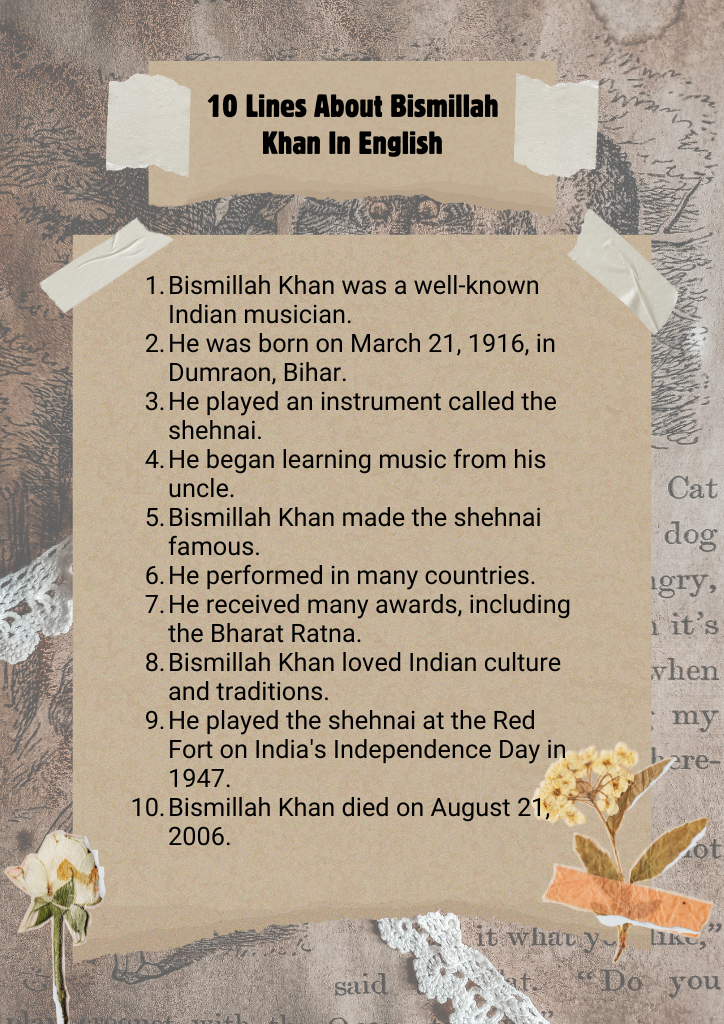Bismillah Khan was a famous Indian musician who was very skilled at playing the shehnai, a traditional Indian musical instrument. Born in a small town in Bihar, he grew up to become a symbol of Indian classical music. His dedication and love for music made the shehnai popular not just in India but all over the world. Bismillah Khan’s life and achievements are an inspiration to many young musicians today. Let’s check 10 lines about Bismillah Khan.
10 Lines About Bismillah Khan In English
- Bismillah Khan was a well-known Indian musician.
- He was born on March 21, 1916, in Dumraon, Bihar.
- He played an instrument called the shehnai.
- He began learning music from his uncle.
- Bismillah Khan made the shehnai famous.
- He performed in many countries.
- He received many awards, including the Bharat Ratna.
- Bismillah Khan loved Indian culture and traditions.
- He played the shehnai at the Red Fort on India’s Independence Day in 1947.
- Bismillah Khan died on August 21, 2006.

Essay On Bismillah Khan In English In 250 Words
Bismillah Khan was a famous Indian musician who was born on March 21, 1916, in Dumraon, Bihar. His real name was Qamaruddin Khan, but he is better known as Bismillah Khan. He grew up in a family of musicians and began learning to play the shehnai at a young age from his uncle, Ali Bux.
The shehnai is a traditional Indian wind instrument, and Bismillah Khan’s exceptional talent made this instrument famous all over the world. He practiced hard every day and performed at many important events. One of his most memorable performances was at the Red Fort in Delhi on August 15, 1947, when India gained independence. His music filled the hearts of millions with pride and joy.
Bismillah Khan’s dedication to music was recognized with many prestigious awards. He received the Bharat Ratna, India’s highest civilian award, in 2001. Despite his fame, he remained a humble and simple man, deeply connected to his roots and traditions.
He traveled to many countries to perform and spread the beauty of Indian classical music. People from different parts of the world admired his music and respected him greatly. Bismillah Khan showed that music has no boundaries and can bring people together.
Bismillah Khan passed away on August 21, 2006, but his music continues to live on. He left behind a rich legacy that inspires many young musicians to follow in his footsteps. His life teaches us the importance of passion, hard work, and staying true to our culture and traditions.
In conclusion, Bismillah Khan was a legendary musician whose love for the shehnai and dedication to music made him a national treasure. His contributions to Indian music are unforgettable, and his legacy will continue to inspire future generations.
| Also Read: 10 Lines On Father’s Day In English |
Essay On Bismillah Khan In English In 750 Words
Bismillah Khan was a legendary Indian musician known for his exceptional skill in playing the shehnai, a traditional Indian wind instrument. Born on March 21, 1916, in Dumraon, Bihar, he grew up to become one of India’s most celebrated musicians. His real name was Qamaruddin Khan, but he became widely known as Bismillah Khan. His music not only made the shehnai famous but also brought Indian classical music to the forefront globally. Bismillah Khan’s life is a testament to dedication, passion, and the rich cultural heritage of India.
Bismillah Khan was born into a family of musicians. His father, Paigambar Bux, and his uncle, Ali Bux, were both accomplished shehnai players. From a young age, Bismillah Khan was surrounded by music, and it was natural for him to be drawn to it. He began learning to play the shehnai under the guidance of his uncle, Ali Bux. His early training was rigorous, but his dedication and passion for music were evident from the beginning.
The shehnai is a difficult instrument to master, but Bismillah Khan’s dedication made him an expert. He practiced for hours each day, honing his skills and developing a unique style. His music was known for its purity and depth, which touched the hearts of many. He played the shehnai with such emotion and skill that it became synonymous with his name. Bismillah Khan’s performances were not just concerts; they were spiritual experiences that connected the listeners with the divine.
Bismillah Khan’s talent did not go unnoticed. He began performing at various events and soon became a household name. One of his most memorable performances was at the Red Fort in Delhi on August 15, 1947, when India gained independence. His shehnai music was played during the first Independence Day celebrations, filling the hearts of millions with pride and joy. This performance marked a significant moment in India’s history and cemented Bismillah Khan’s place as a national icon.
Bismillah Khan’s contribution to music was recognized with many prestigious awards. He received the Sangeet Natak Akademi Award
Bismillah Khan’s fame was not limited to India. He traveled to many countries, including the United States, Canada, Japan, and several European nations, to perform and spread the beauty of Indian classical music. His music transcended cultural and linguistic barriers, earning him admiration and respect worldwide. Through his performances, Bismillah Khan showcased the richness of Indian culture and the universality of music.
Despite his global fame, Bismillah Khan remained deeply rooted in Indian culture and traditions. He believed that music was a way to connect with the divine and that it should be performed with devotion and sincerity. He often said that the shehnai was not just an instrument but a way of life. His dedication to his craft and his love for traditional Indian music made him a true custodian of India’s cultural heritage.
Bismillah Khan passed away on August 21, 2006, leaving behind a rich legacy of music and devotion. His contributions to Indian music are immeasurable, and his influence continues to inspire young musicians. Many aspiring shehnai players look up to him as a role model, striving to achieve the same level of mastery and dedication. His life and music remind us of the importance of preserving our cultural heritage and staying true to our roots.
Bismillah Khan was not just a musician; he was also a loving family man. He had a large family and was deeply connected to his hometown of Varanasi, where he spent most of his life. Despite his fame, he led a simple life, always grounded in his values and traditions. He was known for his humility and kindness, traits that endeared him to everyone who knew him.
Bismillah Khan’s life is a story of passion, dedication, and the power of music. His journey from a small town in Bihar to becoming a global icon is an inspiration to many. He showed that with hard work and devotion, one can achieve great heights while staying true to their roots. Bismillah Khan’s legacy lives on through his music, inspiring future generations to appreciate and preserve the rich cultural heritage of India. His contributions to Indian classical music will always be remembered and cherished.
Conclusion
Today, we have learnt 10 lines about Bismillah Khan. Bismillah Khan’s contribution to Indian music is unforgettable. His passion for the shehnai brought the instrument into the spotlight and earned him great respect and numerous awards. Through his music, he spread the rich cultural heritage of India to many parts of the world. Bismillah Khan’s legacy continues to inspire and guide aspiring musicians, keeping his spirit and love for music alive.

